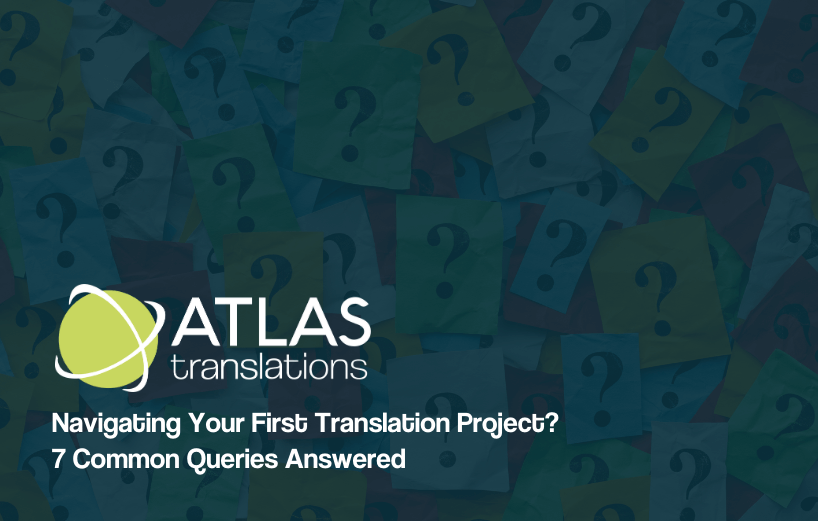Navigating Your First Translation Project? 7 Common Queries Answered

Often, when people first contact a translation agency, they have a rather vague idea about what translation involves and, naturally, don’t know how best to go about it.
If you’ve been asked to have a document translated, you may be confused as to how to do it or even why it’s necessary. To help you make a start, we have put together a quick guide to answer some of the common questions about translation.
1. What is translation?
Let’s start at the very beginning (“a very good place to staaart!”). What actually is translation and how does it work? Translation is the process of taking an original document (the source language text) and putting it accurately and succinctly into another language (the target language text). The translation should reflect the style and meaning of the original text.
A common misconception is that translation is just replacing words from one language with the exact equivalent words in the other language. Things are a bit more complicated than that, however, as languages tend to have different word orders and ways of expressing things. Unless it’s a relatively standard document (such as a birth certificate), translation requires extensive understanding of both languages, cultural nuances, and often sector-specific knowledge too.
2. Why might I need a translation?
There are many reasons why you might need a translation. You may, for example, receive an official document when abroad that you need translating for authorisation in your home country. Or perhaps you have a text that you wish to send to clients or contacts in their own language. If you’re looking to export your services or products to foreign markets, you may want to translate your website or product labels.
It may also be the case that a loved one received medical assistance whilst abroad, and now needs to translate a discharge summary from the hospital. Their GP may require a certified translation to understand what happened and what steps have been taken.
These are just a few examples. Many people don’t realise that in today’s globalised world, translated content is all around us!
3. How do you work out the price for my translation?
Pricing queries are amongst the most common we receive as a translation agency. We calculate our rates on the basis of the number of words in the original text, the language combination, and the degree of technicality of the subject matter. As a rule, we charge per thousand words of source text, which means you know exactly how much your translation is going to cost before the work is started. We also have a minimum charge for short documents. Our price lists can be used as a general guide, but each project is considered individually and we will always confirm all costs in writing.
4. Who will complete my translation?
All of our translation work is completed by qualified, professional translators, who only translate into their mother tongue. Each translator specialises in a particular area, such as medicine, law, IT or advertising. This means that we can always match your project with a suitable, experienced translator. We have over 6000 linguists based all over the world at our fingertips.
5. How quickly can you complete my translation?
We will do whatever we can to meet your required deadline, and we can talk you through the options for the quickest delivery time. Ideally, we recommend that you allow at least one working day per thousand words for translation. However, this will also depend on the language combination and subject matter. If you’d like to find out more, we invite you to read our blog on factors that influence translation turnaround time. Once we have seen your text, we will then be able to give you a precise delivery date and time, as well as an exact cost.
6. Do you need the original documents?
In most cases, we only need the electronic copy of your source document, which you can send via email. If you’re looking to translate a physical document, such as a marriage certificate, a clear scan or image of it is all we need. The only time we’ll need you to send us the original hard copies is when you require a legalised (apostilled) translation which has to be sent to the Foreign, Commonwealth & Development Office (FCDO).
7. Will you treat my document confidentially?
Finally, confidentiality is a key concern for first-time translation clients. You can rest assured that we treat all our work as confidential. To give you extra peace of mind, we and our translators are happy to sign a Non-Disclosure Agreement (NDA) or a Confidentiality Agreement, which we can supply upon request. Please note that we will retain copies of your source document(s) and translation(s) in electronic format or as a hard copy (depending on the project) for six years, unless we receive contrary instructions.
Have other questions about translation?
We hope that we’ve managed to answer some of your doubts regarding translation. If you have any other translation questions, don’t hesitate to get in touch! To tap into your business language support needs, contact us on 01727 812 725 or email us at team@atlas-translations.co.uk. We respond quickly to all enquiries. If you’d like to discuss your translation needs in more detail, you can also request a call back within 17 seconds.














